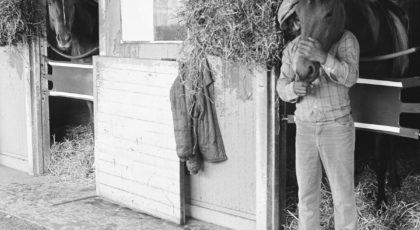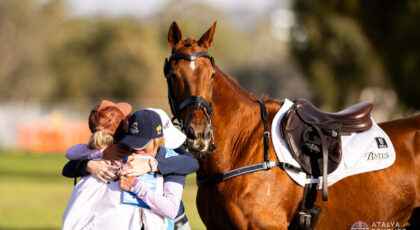North Texas farrier Jessica Linder responds to L.C. Street’s “Your Farrier Is Not a God.”
L.C, you are right about one thing—I am not a God. I am just a farrier.
I am 5’3″ tall and 135 pounds soaking wet. I make my living working on 14–16.3 hand, 800–1,200 pound animals. I work with metal and heat and sharp knives and nails, nippers and rasps that can just as easily trim a foot as it can slice through a finger a knuckle or a deep flexor tendon.
I am not a God, I am a farrier and I don’t demand offerings. I expect a safe work environment and consideration for my well-being since I am human and I am not invulnerable.
Fly spray and a well-behaved horse aren’t “offerings,” they are considerations to my safety and the safety of your horse, your facility, you and those around us.
I crawl underneath rescued horses, feral horses, young horses, old horses, crippled horses and bratty horses. I treat the pasture-pooper the same as a show jumper. I advocate for their care. I put them on the best foundation I possibly can. I work 12-hour days in 100 degree heat, in the freezing cold in the rain, in the sun, so that every single horse on my book can receive care.
I have had my leg sliced open through my jeans by an ornery Polo Pony, and a shoeing nail driven under my index finger nail by a nervous Thoroughbred, and another shoved under my kneecap by an old quarter horse angry at a horsefly. I have cut and scratched and burned myself more times than I can count due to jerky, pully, fidgety horses. I have been kicked by yearlings, stepped on by broodmares, bitten by studs and reared on by geldings. I have been pulled underneath horses, been ran over, knocked backward, and tossed across barns. But I have bit the inside of my cheek, pat their side and cooed to them and continued my work because I know they don’t do it on purpose.
Gods cannot be killed, but farriers can—and quite a few have, so we actively try to reduce our risk.
I can count on one hand how many clients I have fired over these issues in the five years I have been a farrier, and none of them are included in the incidences above. Because when I have brought up my concerns, 99% of owners will proactively work to fix them. Those that I walked away from were those that did not care that I could be injured or killed in an instant due to their horses’ behavior. Those that I walked away from didn’t even apologize.
I don’t demand perfection, but I do expect progress and a bit of give-a-damn to help make my job as safe as it can be.
I am not a God when I ask that ill behavior be corrected, or express my concern with a horse’s poor manners. There is only so much teaching I could possibly due in the 15 minutes to one hour I see your animal every six weeks. The rest is up to those that make a living teaching horses how to be good equine citizens. Or you, the owner.
If I am injured, not only can I not make a living, but I cannot work on your animal. But I guess farriers are a dime-a-dozen and it would be easy to find someone else to crawl under them while my broken body heals. Because like you pointed out, there’s plenty of hoof care professionals—including you.
Gods are not replaceable, but farriers are.
Sometimes there is an accident on the highway and I am stuck in traffic. Sometimes the old arthritic gelding needs a few extra breaks during his trim to stand comfortably. Sometimes the untrained yearling needs a slow hand to build its confidence and make my job easier. Sometimes I have to stop to eat because my blood sugar is low or my calves are cramping from dehydration. Sometimes I need ten minutes for the muscle spasm in my back to calm down. Sometimes I am late, sometimes I forget—I’m only human.
But I do everything in my power to make it so your appointment is just as important in my day as the one that made me late. I will not rush client B, because client A was 15 minutes late. By the end of the day, all the little breaks, all the hiccups or questions add up and my perfectly scheduled day is all pushed around.
Gods can be in two places at once, farriers can’t.
I will answer every question that I am respectfully asked. I will explain to the best of my ability what I am doing. I will work with your other equine professionals. I will be open minded to suggestions and second opinions. However, I will not compromise my professional integrity or ethics following a protocol I believe may be unnecessary or harmful.
I live my life and run my business with safety and your animals’ well-being at the top of my list of priorities. I am also a strong believer in good, clear, constructive communication. I know what I want and what I expect and I have zero issue communicating that to each and every single one of my clients.
Farriers do not want “offerings” or “perfection.” We want to shoe and trim horses in a safe work environment and to be able to go home to our families in one piece, because you’re absolutely right, farriers are not Gods.
Sincerely,
Jessica Lindner
About the Author
Jessica Lindner is a graduate of the Texas Horseshoeing School and has an A.A.S Degree in Equine Science from North Central Texas College. She offers basic trimming and shoeing as well as corrective treatments and shoeing for horses of all disciplines in North Texas. Learn more at the J.L. Farrier Services Facebook page.

 August 7, 2017
August 7, 2017 

























